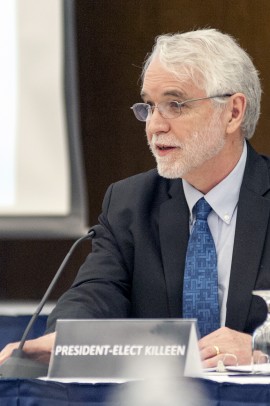Trustees approve new medical school in Urbana
 The University of Illinois Board of Trustees voted Thursday to create a technology-centered College of Medicine in Urbana-Champaign — the campus’ first new college in nearly 60 years.
The University of Illinois Board of Trustees voted Thursday to create a technology-centered College of Medicine in Urbana-Champaign — the campus’ first new college in nearly 60 years.
The board also learned that President Robert Easter and incoming President-designate Timothy L. Killeen will complete their transition at the end of the academic year, with Killeen officially taking office May 18.
During its meeting on the Urbana campus, trustees approved a recommendation by Easter to launch the small engineering-focused medical school, which was proposed last year to promote breakthroughs in treatment and equipment by integrating technology into medical training and research.
The board directed the campus to begin planning to create the new college and provide a progress report in May that addresses organizational structure and other implementation issues.
In November, trustees directed Easter to study the proposed medical school, which would be created in partnership with Urbana-based Carle Health System, as well as a counterproposal from the UIC College of Medicine calling for a bioengineering research institute at UIUC affiliated with the existing medical school that would have pursued technology-based advances in partnership with UIUC’s College of Engineering. The UIC proposal would have integrated engineering and technology into training for all of the university’s 1,300 medical students.
Easter told trustees that the intersection of engineering and medicine is described by many as the next frontier of scientific advancement and the new medical school has the potential to make the Urbana campus a global leader in an emerging field that could have a profound impact on health care delivery in the U.S.
Easter: new school will complement UIC college
He said the new medical school matches the Urbana campus’ land-grant mission, promising breakthroughs in health care to serve the nation’s needs — similar to the needs for advances in engineering and agriculture that were at the core of the institution’s founding nearly a century and a half ago.
“The need for the land-grant approach to solve society’s greatest challenges remains,” Easter said. “The new medical school holds the potential to capitalize on the Urbana campus’ global leadership in engineering to help drive a new era of progress and economic growth.”
Easter said the innovation-focused medical school in Urbana will complement the UIC College of Medicine, which is the nation’s largest and a leader in clinical training, producing about 300 graduates annually and one of every six doctors practicing in Illinois. Combined, he said, the medical schools will better position the university to serve the needs of students and the state.
Board chairman Edward McMillan said the highly specialized medical school promises to further elevate the College of Engineering in Urbana, already recognized as one of the world’s best.
“Bioengineering and biomedicine are emerging fields, so this new medical school will add to the university’s legacy as the home of pioneering scholarship that draws top faculty and students from around the world,” McMillan said.
Campus officials will begin planning to launch the college, the first since what is now known as the College of Applied Health Science was created in 1957. A progress report will be presented to trustees at their May 7 meeting in Springfield, addressing implementation issues that include:
- the future of the existing regional medical campus at UIUC, a branch of the UIC College of Medicine that trains about 100 first-year medical students every year and about 120 students in a Medical Scholars program that provides both a medical degree and a Ph.D. in other disciplines
- finalizing a formal financial agreement with Urbana-based Carle Health System, which has pledged $100 million over 10 years to support the new college. If for any reason an agreement with Carle cannot be reached, the resolution approved by the board would not allow UIUC to seek a new partner or pursue a separately accredited medical school in Urbana.
- developing a governance structure for the new college that would facilitate collaboration between the Chicago and Urbana-Champaign campuses.
Urbana Chancellor Phyllis Wise proposed the new medical school more than a year ago, a partnership with Carle that will combine traditional doctor’s training with engineering, computer science and technology to foster innovation that provides better care at lower cost through new medical devices and procedures.
Preliminary plans call for enrolling the first 25 students in 2017 and increasing admissions gradually to 50 a year by 2023-24, when the college would educate more than 200 students annually.
A financial plan shows that the college could operate without state support and would be established through funding from Carle and $135 million in gifts from donors.
Presidential transition set
Easter told the board that he and Killeen will complete their transition at the conclusion of the academic year. Both will participate in May commencement activities on the three U of I campuses in Chicago, Springfield and Urbana-Champaign.

Timothy Killeen will officially take office as university president May 18. Photo: Roberta Dupuis-Devlin/UIC Photo Services
The symbolic passing of the torch from the 19th to the 20th president will take place at the conclusion of the commencements, when Easter will bestow the Presidential Medallion on Killeen.
Easter has spent 42 years with the university, beginning as a graduate student in 1973. His service included appointments as a faculty member, department head, dean and interim chancellor at Urbana and was capped by his tenure as president since 2012. His retirement will be effective May 17. Killeen, who was selected to succeed Easter by the Board of Trustees in November, will have his first day as president May 18.
When trustees approved Killeen’s appointment, they set an effective date for the new president of July 1 or “a mutually agreeable earlier date.” Easter and Killeen said the ongoing transition has been smooth and the end of the academic year is an appropriate time to make the change.
Killeen has been transitioning from his role as vice chancellor for research at the State University of New York system. He has traveled frequently from Albany during the last two months to work with Easter and to meet with chancellors, provosts, students, deans, faculty, staff, alumni, donors and elected officials during visits to the university’s three campuses, as well as with lawmakers in Springfield and Washington.
At Thursday’s meeting, McMillan directed Killeen to begin developing a university-wide strategic plan to ensure that the university meets the future needs of its many stakeholders and fulfills its missions of education, research, public service and economic development. The university-wide visioning strategy, which would incorporate plans recently developed by the three campuses, will be completed within 18 months and discussed at a board retreat July 22.
New trustees
Trustees installed UIC alumnus Ramon Cepeda as a new member of the board. Cepeda was appointed to a six-year term last month by Gov. Bruce Rauner, along with Urbana graduate Jill Smart. Smart was unable to attend Thursday’s meeting and will be installed in May.
Cepeda, 47, an independent from Darien, is senior vice president of Northern Trust Corp. in Chicago, where he oversees the commercial real estate group he created in 2010 and is managing director of the financial services institution’s wealth management division. He graduated from UIC in 1990 with a degree in criminal justice.
Smart, 55, a Republican from Downers Grove, is president of the National Academy of Human Resources, a nonprofit organization that recognizes institutions and individuals for achievement in human resources. She retired last year from Accenture in Chicago, where she served for a decade as chief human resources officer for the managing consulting and technology services company. She graduated from the Urbana campus in 1981 with a degree in business administration.
Cepeda and Smart, who serve on the board of the University of Illinois Alumni Association, fill seats held by former board chairman Christopher Kennedy and Pamela Strobel, whose terms expired in January.
Categories
Topics
bioengineering, Board of Trustees, College of Medicine, medical education, medicine, university administration
